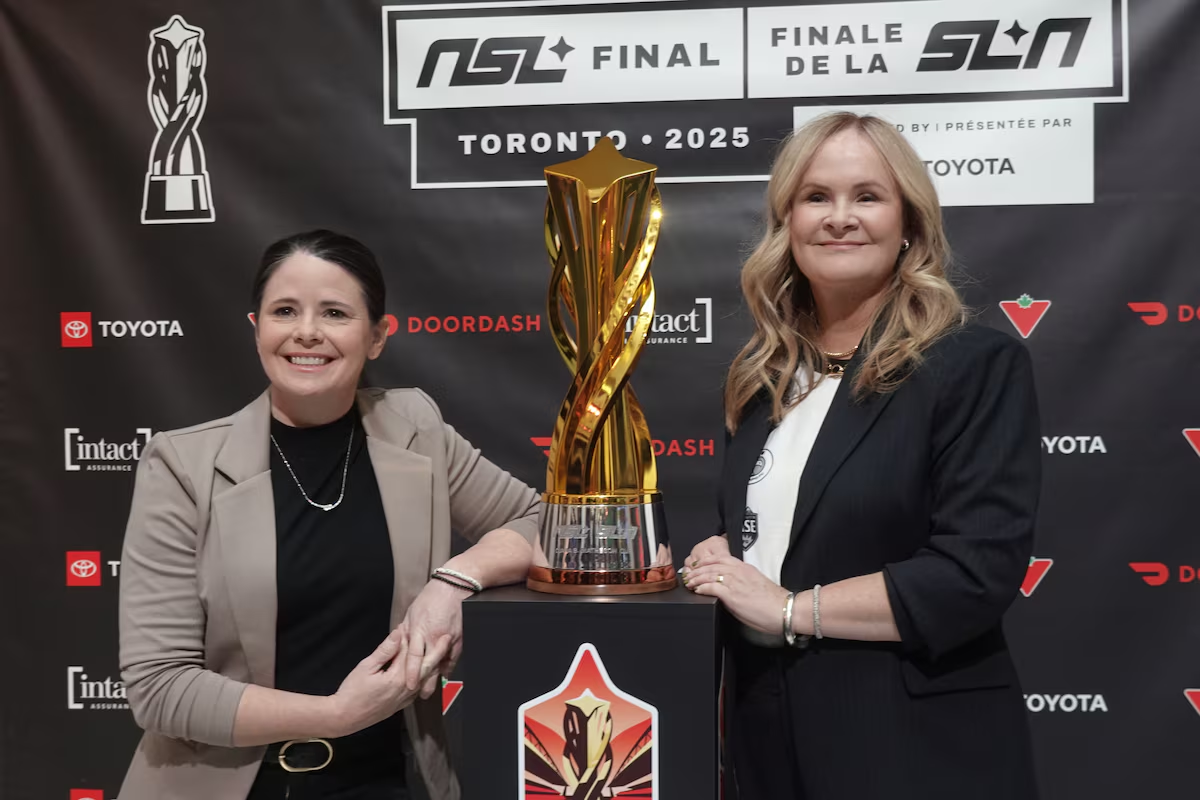NSL final brings inaugural season of women’s pro soccer to a close, with eyes to the future

Open this photo in gallery:
Diana Matheson, left, co-founder and chief growth officer of the Northern Super League, and NSL president Christina Litz pose in Toronto, on Thursday, Nov. 13, 2025, next to the Diana B. Matheson Cup, which will be awarded after Saturday’s championship game between AFC Toronto and Vancouver Rise FC.Neil Davidson/The Canadian Press
Saturday will be an emotional day for Diana Matheson.
When AFC Toronto and Vancouver Rise take the pitch at Toronto’s BMO Field for the Northern Super League final – bringing down the curtain on the inaugural season for Canada’s first professional women’s soccer league – it promises to be a time of unbridled joy for the many stakeholders who helped bring the league to life.
But no matter which team hoists the Diana B. Matheson Cup after the final whistle, for the trophy’s namesake, it will be a time of reflection. As the woman who scored the goal to secure this country’s first Olympic medal in women’s soccer 13 years ago – following the semi-final loss to the United States that was one of those “where were you when …” sporting moments – she can only marvel at the growth the women’s game has undergone since then.
“It’s absolutely a straight line from 2012 to what’s happening now,” she said Thursday. “That brought in the next generation of players that wanted to win not just medals, but gold medals. It brought in the visibility and awareness of the team. It gave us platforms we didn’t have before.”
Few used their platforms as benevolently as Matheson, who took up the charge toward sowing the seeds of what would become the NSL immediately after hanging up her cleats in 2021. After earning her MBA from the Smith School of Business at Queen’s University, she put together the business case for a landmark league for women’s sports in Canada with her Masters classmate Thomas Gilbert. That vision came to fruition when the Vancouver Rise and Calgary Wild FC match kicked off at Vancouver’s BC Place back on April 16.
Documentary goes behind the scenes on the birth of the Northern Super League
“Women’s sport, we’re saying it. We’re not a moment now. We are a movement,” Matheson said. “But when you zoom way out in the grand history of time, we’re still right now, a little speck on that timeline. And we have to remind people we’re here and we’re here to stay.”
With more than 275,000 tickets sold in the inaugural season, the NSL positioned itself inside the top five for attendance in the world of professional women’s soccer, and secured roughly $30-million in revenue – enough to put it in the top eight globally. By way of context, Matheson pointed out that the Swedish women’s elite league, the Damallsvenskan, which was formed in 1988, reported record revenues of €18-million ($29.3-million) this year.
“And that’s after 37 years,” she said. “And we’ve done that number in Year 1.”
Though the league isn’t currently profitable, NSL president Christina Litz says the entity is “in investment mode right now.” While she adds it will take years to get the league into the black, she’s targeting broadcast revenue as a pipeline of financial growth.
“Once we do that, we should be in a profitable position,” she said.
Open this photo in gallery:
Vancouver Rise’s Latifah Abdu, right, celebrates with teammate Jessika Cowart after scoring a goal against Ottawa Rapid FC during their semi-final match earlier this month.RICH LAM/The Canadian Press
Currently, the league is paying to produce the broadcasts of its own games, following the model used by the Professional Women’s Hockey League. That gave it a reach of three million Canadians in the first year, according to NSL numbers.
One of the aims of the fledgling league was to help steer talent into national team programs. As someone who has made 206 international appearances for Canada, Matheson is well aware of the importance of nurturing talent to appear on the big stages.
The NSL managed to get seven players into Canadian national-team camps, including AFC Toronto players Emma Regan and Kaylee Hunter, and Vancouver Rise forward Holly Ward – who became the first NSL player to score for the national team when she found the net against Haiti in June.
“We’re going to continue to work with [Canada head coach Casey] Stoney to create more opportunities, more connections, and do our part in this league to help Canada win a World Cup,” Litz said.
One of the other points of pride for the NSL was the level of competition amongst its six teams – with a seventh announced to arrive in 2027. Eighty-five per cent of the games were decided by two goals or less – including four of the five meetings between NSL championship finalists Toronto and Vancouver – with an average of 2.6 goals per match.
That level of entertainment should pay dividends, both in the short and long term.
AFC Toronto head coach Marko Milanovic, who pushed his players to play an exciting brand of soccer, led his team to the 2025 Supporters’ Shield as the top regular-season team, scoring the most goals along the way.
“This league really exceeded my expectations by a mile, I would say,” he said. “I didn’t know what to expect. I wasn’t even sure whether to take the job or not at first, to be honest with you. But I’m so glad I did.”
Like any coach in world soccer, winning is important for Milanovic as well as his players. However, he admits that passing on their passion for soccer to future generations is similarly vital.
“That’s my favourite, when I see so many little girls watching the game, and boys,” Milanovic said, “because I think our players have such a big opportunity here to inspire, which is much bigger than the actual product on the field.”
Open this photo in gallery:
Vancouver Rise head coach Anja Heiner-Moller, seen after an early-season game, was drawn to the NSL, watching from her native Denmark as it was being built.DARRYL DYCK/The Canadian Press
Looking on from afar, Anja Heiner-Moller, who was coaching the national under-19 women’s team for her native Denmark before taking the job of head coach for the Vancouver Rise, says the NSL was always going to be a success.
“I was waiting for this league to come to Canada and I wanted to be in it,” said Heiner-Moller, who is married to the former Canadian women’s national team coach, Kenneth Heiner-Moller.
“I pushed to be in it. And since the beginning, like the planning for the three years, just been watching from Denmark as well to see it get built. And I mean, if you wait that long to build a league, I think you also know that this will be great when it starts up.”
Heiner-Moller led the Rise to the third-best record in the NSL, finishing 12 points back of first-place Toronto. However, while the two teams split their five games, with one draw between them, Vancouver did win their one contest held at BMO Field. AFC Toronto played most of its home games at York University.
In fact, Milanovic will be hoping its third time lucky for his squad. In the two games it played at BMO Field, it lost both, failing to score a goal against either Vancouver or the Montreal Roses, who upset Toronto in its home opener back in April.
“We hit the woodwork, I think, six or seven times in those two games. I think we created enough chances to score three, four goals in those two games,” Milanovic said. “We really wanted to get to the final to have a chance to win at this stadium in our city. We’re so lucky to have that, and hopefully we can score this time and get the win.”
Editor’s note: This article has been updated to correct the name of Calgary’s Northern Super League team, the Calgary Wild FC.





